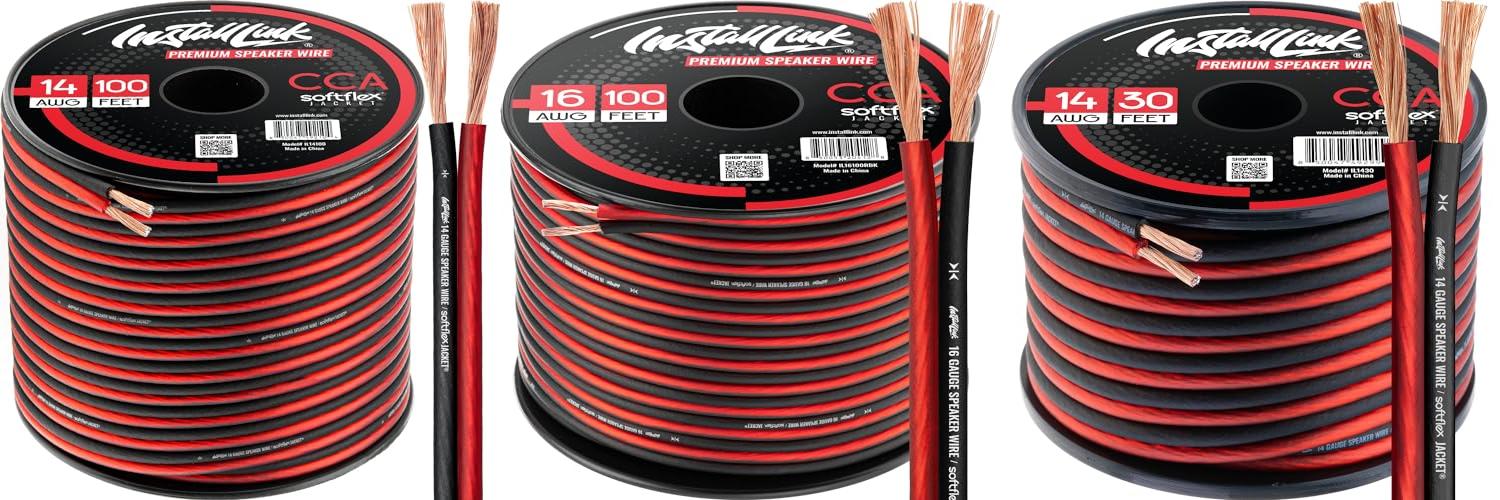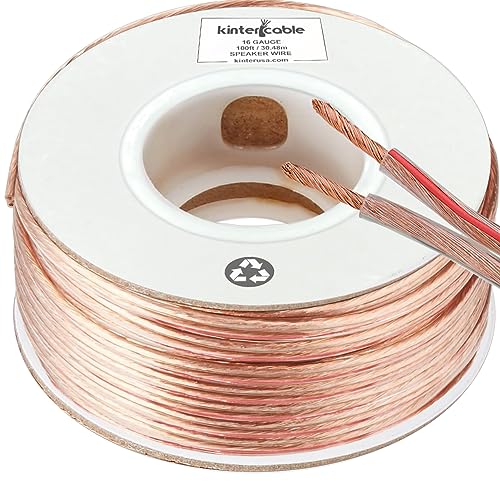Have you ever cranked up your car stereo, only to hear a fuzzy, disappointing sound? You might have spent a lot of money on speakers and a new amp, but the weak link could be something simple: your speaker wire! Believe it or not, the wire connecting your audio system is super important. It carries the sound from your amp to your speakers. If the wire is bad, your music will sound bad too.
Choosing speaker wire for your car audio can be tricky. There are different sizes, materials, and prices. It’s easy to feel confused and unsure what to pick. Don’t worry, we’re here to help! This guide will explain everything you need to know. We’ll make sure you understand the basics and avoid common mistakes.
By reading this blog post, you’ll learn how to choose the best speaker wire for your car. You’ll discover the right wire size and type for your system. We’ll also cover how to install the wire correctly, so you can enjoy clear, powerful sound. Get ready to improve your car audio experience! Let’s dive in and learn about the best speaker wire options for your ride.
Our Top 5 Speaker Wire For Car Audio Recommendations at a Glance
Top 5 Speaker Wire For Car Audio Detailed Reviews
1. Install Link 14 Gauge Speaker Wire (Speaker Cable) for Car
Rating: 9.4/10
Upgrade your audio system with the Install Link 14 Gauge Speaker Wire! This wire is built for cars, homes, and RVs. It comes in a 100-foot roll. This speaker wire helps you connect your speakers to your receiver or amplifier. It is a great choice for both beginners and experts. Get ready for better sound!
What We Like:
- The wire is made with copper-clad aluminum. This gives good sound quality.
- It’s easy to install. You can use it in your home, car, or RV.
- The soft jacket makes the wire flexible and strong.
- The wire is perfect for DIY projects. It is also good for professional use.
- The wire is clearly marked for polarity. This helps with installation.
What Could Be Improved:
- Some users might prefer pure copper wire for even better sound.
This Install Link speaker wire is a solid pick for anyone who wants to improve their audio. It offers good performance and is easy to use. You can’t go wrong with this speaker wire!
2. 16 AWG Gauge Speaker Wire Cable Stereo
Rating: 9.2/10
The Install Gear 16 AWG Gauge Speaker Wire Cable is a good choice for your sound system. This wire is made for stereo systems, car audio, and home theaters. It comes in a 100-foot roll. The wire uses copper-clad aluminum (CCA) for good sound. It is easy to install and works well for both beginners and experts.
What We Like:
- The wire is easy to identify the positive and negative sides.
- It is flexible and easy to work with.
- This wire is good for home theaters, car audio, and studios.
- The soft jacket protects the wire and makes it last longer.
- It is a cost-effective option for speaker wire.
What Could Be Improved:
- Some users may prefer a pure copper wire for even better sound quality.
Overall, the Install Gear speaker wire is a solid choice. It is a good value for the price and easy to use. This wire will help you get great sound.
3. Install Link 14 Gauge Speaker Wire (Speaker Cable) for Car
Rating: 8.6/10
The Install Link 14 Gauge Speaker Wire is a great way to connect your speakers. This speaker cable works for your car, home, or RV audio system. It comes in a 30-foot length and is made with CCA (Copper-Clad Aluminum). This wire is designed to give you excellent sound quality and is easy to install.
What We Like:
- The wire is made with high-grade copper and aluminum.
- It’s easy to strip and identify the positive and negative wires.
- The CCA design helps with good sound and reduces signal loss.
- This speaker wire is perfect for home theaters, car audio, and studios.
- It’s simple to hook up to your receiver or amplifier.
- The soft jacket makes the wire strong and easy to work with.
What Could Be Improved:
- Some users may prefer a pure copper wire for even better sound.
Overall, this Install Link speaker wire is a good choice for anyone needing to connect speakers. It offers good value and is easy to use for various audio setups.
4. Install Link 16 AWG Gauge Speaker Wire Cable (30 Feet) Stereo
Rating: 8.7/10
The Install Link 16 AWG Gauge Speaker Wire Cable is a good choice for your speakers. This 30-foot wire is perfect for home theaters, car audio, and studio setups. It is made of copper-clad aluminum (CCA) and designed for great sound. The wire is easy to strip and install, making it a good option for anyone. It is also flexible and looks good. You can connect your speakers to your receiver or amplifier without problems.
What We Like:
- The wire is made with high-grade copper and aluminum.
- It provides great audio performance.
- It is easy to strip and identify the positive and negative sides.
- The CCA design provides good conductivity.
- It is a good option for home theaters, car audio, and studios.
- Installation is simple.
- The soft jacket makes it durable and easy to work with.
What Could Be Improved:
- Some users may prefer pure copper wire for better sound quality.
Overall, the Install Link speaker wire is a good option. It is easy to use and provides good performance for the price. This is a good choice for DIY projects.
5. Kinter Cable 100ft 16-Gauge Audio Stereo Speaker Wire Cable
Rating: 9.2/10
Need speaker wire? The Kinter Cable 100ft 16-Gauge Audio Stereo Speaker Wire Cable is a great choice. This wire is perfect for connecting your speakers to your receiver. It works well for home theaters, HiFi systems, surround sound setups, and even car audio amps. The Kinter Cable promises a clear and reliable sound connection. It’s easy to use and store, making it ideal for both beginners and experienced users.
What We Like:
- You get 100 feet of speaker wire.
- It’s made with 16-gauge wire, a good size for most speakers.
- The wire is made with CCA (Copper Clad Aluminum), a good quality wire.
- The red stripe helps you keep the correct polarity.
- The PVC jacket is flexible and easy to work with.
- The spool is recyclable and easy to use.
What Could Be Improved:
- Some users may prefer pure copper wire for better sound quality.
In conclusion, the Kinter Cable speaker wire is a solid option. It offers great value and is easy to use for connecting your speakers.
Speaker Wire for Car Audio: Your Guide to Awesome Sound
Getting the best sound in your car means choosing the right speaker wire. This guide will help you find the perfect wire for your car audio system. Let’s dive in!
Key Features to Look For
You need to know what makes good speaker wire. Here are some important things to consider:
- Gauge (Thickness): Speaker wire comes in different thicknesses, called gauges. A lower gauge number means a thicker wire. Thicker wires handle more power and are better for longer runs or powerful amplifiers. Common gauges for car audio are 16, 14, and 12.
- Oxygen-Free Copper (OFC): This is a good sign! OFC wire is made with pure copper. It helps deliver the best sound quality. You want the music to sound amazing!
- Flexibility: You’ll be running the wire in your car. It needs to bend easily around corners and through tight spaces. Look for wire that is flexible.
- Insulation: The insulation protects the wires from damage. It also protects you from getting shocked! Make sure the insulation is durable and can handle heat and moisture.
- Length: Measure how much wire you need. It’s better to have a little extra than not enough.
Important Materials
What is speaker wire made of? The materials matter!
- Copper Conductors: The actual wire inside is made of copper. Copper is a great conductor of electricity. It carries the signal from your amplifier to your speakers.
- Insulation: The insulation is usually made of plastic, like PVC (polyvinyl chloride). It protects the copper wires. It keeps them from touching each other and shorting out.
Factors That Improve or Reduce Quality
Some things make speaker wire better, and some make it worse.
- Quality Copper: OFC (Oxygen-Free Copper) is the best. It allows the best signal transfer. Cheaper wire may use CCA (Copper-Clad Aluminum). This is okay for some situations, but it may not be as good.
- Gauge: Choose the right gauge for your needs. Thicker wires are better for more power and longer runs.
- Construction: Some wires have a twisted pair design. This can help reduce noise and interference.
- Insulation Quality: Good insulation protects the wire from damage and the elements. It makes the wire last longer.
- Brand Reputation: Some brands are known for making high-quality speaker wire. Research brands before you buy.
User Experience and Use Cases
How will you use the speaker wire? Think about your car audio setup.
- Installation: You’ll need to run the wire from your amplifier to your speakers. This might involve removing trim panels and running the wire under the carpet.
- Power Handling: If you have a powerful amplifier, you need thicker wire. This will ensure the speakers get enough power.
- Sound Quality: Good speaker wire helps deliver clear and accurate sound. You’ll be able to hear all the details in your music.
- Reliability: Choose a wire that is durable and will last. You don’t want to replace it anytime soon.
- Common Use Cases:
- Upgrading factory speakers.
- Adding an amplifier and subwoofer.
- Replacing old or damaged speaker wire.
- Building a custom car audio system.
Frequently Asked Questions (FAQ)
Here are some common questions about speaker wire:
Q: What gauge speaker wire should I use?
A: It depends on your system. 16 gauge is good for most factory upgrades. 14 or 12 gauge is better for higher power amplifiers and subwoofers.
Q: What is OFC speaker wire?
A: OFC means Oxygen-Free Copper. It’s high-quality copper that delivers better sound.
Q: Is CCA speaker wire okay?
A: CCA (Copper-Clad Aluminum) is cheaper. It can work, but it may not perform as well as OFC.
Q: How do I measure the length of speaker wire I need?
A: Measure the distance from your amplifier to each speaker. Add some extra for turns and connections.
Q: Can I use regular wire for speaker wire?
A: You can, but it is not recommended. Speaker wire is designed for audio signals. It has better insulation and is more flexible.
Q: What does “twisted pair” mean?
A: Twisted pair wires have the wires twisted together. This helps reduce noise and interference.
Q: How do I connect speaker wire to my speakers and amplifier?
A: You’ll usually use speaker wire connectors or terminals. Make sure you connect the positive and negative wires correctly.
Q: What if my speaker wire gets wet?
A: Water can damage speaker wire. Make sure your wire is protected from moisture. This may involve running it through protected areas of your car.
Q: Can I run speaker wire near power wires?
A: You can, but it’s best to keep them separate. This helps prevent noise and interference.
Q: How much does speaker wire cost?
A: The cost varies. It depends on the gauge, length, and quality. You can find good quality wire for a reasonable price.
In conclusion, every product has unique features and benefits. We hope this review helps you decide if it meets your needs. An informed choice ensures the best experience.
If you have any questions or feedback, please share them in the comments. Your input helps everyone. Thank you for reading.

Hey there, My name is Joe Martin & I’m the author of OffroadersGuild.com. I’ve been hitting the dirt for a while now. I’ve been off-roading in all sorts of vehicles, from Jeeps to trucks and everything in between.
I’ve also built and modified a few off-road vehicles of my own, so I know what works and what doesn’t when it comes to upgrading and modifying off-road vehicles. I started this website to share my experience and help others get the most out of their off-roading adventures. Let’s hit the trails!






